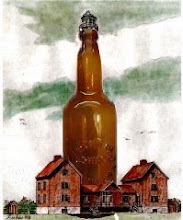Oskar Blues has agreed to purchase Michigan’s Perrin Brewing Company, a smaller craft operation founded in 2011. The pickup may be the first in a series of investments for Oskar Blues, a top-25 craft brewery.
The acquisition is backed by investments from Fireman Capital Partners and former West Side Distributing owner, Keith Klopcic, according to Oskar Blues’ founder, Dale Katechis. He said the transaction is expected to close within the next 60 days.
Katechis said a deal between the two companies closed in early March; while he would not elaborate, sources familiar with the transaction have described the investment as a “special purpose fund,” and a vehicle for acquiring more craft brands.
Oskar Blues made 149,000 barrels in 2014 and had revenues of $43 million. The brand is currently sold in 42 states and Washington D.C.
Oskar Blues brewed a batch of beer with the company last fall and discussions about a possible acquisition began moving forward.
“The idea of hyper local is becoming more and more relevant to the consumer and obviously affecting the entire industry’s business models,” said Katechis. “We want to continue to be aggressive and strong and in our minds, this is our way of having one more card that we could play and it is real and genuine.” ...more Brewbond mlive.com/oskar_blues
Saturday, March 28, 2015
Thursday, March 5, 2015
Pigeon Hill Expanding
Muskegon-based Pigeon Hill Brewing Co. opened less than a year ago and has agreed to purchase a 9,270-square-foot-facility in Muskegon, at 441 W. Western Ave., which is across the street from its taproom, Grand Rapids Business Journal posted on March 3.
The project will end up costing Pigeon Hill about $1 million, with financing help from a bank.
Pigeon Hill Brewing co-founder and CEO Joel Kamp said the brewery wasn’t actively seeking a production facility, but was contacted by the owner of the building, represented by Signature Associates. The facility will house a 20-barrel brewhouse with two fermenters to start — either 60- or 90-barrels each — and a brite tank. A barrel is 31 gallons. Brewing will stagger between several of the brewery’s mainstay beers, such as Shifting Sands IPA, Walter Blonde Ale and Renegade White Double IPA.
The brewery will also purchase a canning line to help extend the brewery’s reach. The brewery in the company’s taproom can sufficiently meet guest demand there. “This expansion is mostly for distribution,” Kamp said. “This will also us to get into canning and further into the market at tap and off-premise retail accounts.”
Prior to being approached about the new location, Kamp said Pigeon Hill Brewing did expect to expand production in another year or two. Now, the company expects to have the brewery site operating by the end of the year. Kamp said the brewery's initial opening was delayed by a variety of approvals and build-out issues, but many of the issues at the new building have are already been completed.
Pigeon Hill’s goal is to brew 5,000 barrels annually within the next four years.
The project will end up costing Pigeon Hill about $1 million, with financing help from a bank.
Pigeon Hill Brewing co-founder and CEO Joel Kamp said the brewery wasn’t actively seeking a production facility, but was contacted by the owner of the building, represented by Signature Associates. The facility will house a 20-barrel brewhouse with two fermenters to start — either 60- or 90-barrels each — and a brite tank. A barrel is 31 gallons. Brewing will stagger between several of the brewery’s mainstay beers, such as Shifting Sands IPA, Walter Blonde Ale and Renegade White Double IPA.
The brewery will also purchase a canning line to help extend the brewery’s reach. The brewery in the company’s taproom can sufficiently meet guest demand there. “This expansion is mostly for distribution,” Kamp said. “This will also us to get into canning and further into the market at tap and off-premise retail accounts.”
Prior to being approached about the new location, Kamp said Pigeon Hill Brewing did expect to expand production in another year or two. Now, the company expects to have the brewery site operating by the end of the year. Kamp said the brewery's initial opening was delayed by a variety of approvals and build-out issues, but many of the issues at the new building have are already been completed.
Pigeon Hill’s goal is to brew 5,000 barrels annually within the next four years.
Subscribe to:
Comments (Atom)



